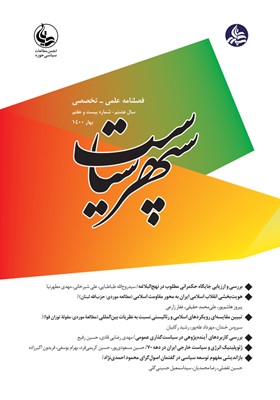نقش آیندهپژوهی در قوانین دینی برای اداره جامعه براساس نظریه ادراکات اعتباری
محورهای موضوعی : سیاست پژوهی ایرانی (سپهر سیاست سابق)
سید حاتم مهدوی نور
1
![]() ,
حسین حاجی پور
2
,
حسین حاجی پور
2
![]() ,
عیسی مولوی وردنجانی
3
,
عیسی مولوی وردنجانی
3
1 - استادیار، واحد یادگار امام(ره)، شهرری، دانشگاه آزاد اسلامی، تهران، ایران
2 - استادیار، واحد یادگار امام (ره)، شهرری، دانشگاه آزاد اسلامی، تهران، ایران
3 - دکتری مدرسی معارف اسلامی، دانشگاه معارف اسلامی، قم، ایران
کلید واژه: دین, علامه طباطبائی, علوم اعتباری, آیندهپژوهی,
چکیده مقاله :
هدف پژوهش حاضر بررسی مدل قانونگذاری دین و شریعت اسلامی برای اداره جامعه، براساس نظریه ادراکات اعتباری علامه طباطبائی است. روش پژوهش توصیفی- تحلیلی بوده و نتایج نشان داد که دین اسلام در بخش نیازهای متغیر انسان به جای وضع قانون ثابت، اصولی را مطرح کرده که اسلامشناسان میتوانند با آیندهپژوهی به آیندههای ممکن علم پیدا کرده، آینده مطلوب دینی را برای وصول انتخاب نمایند و در چارچوب آن اصول، متناسب با شرایط مکان و زمان برای ساخت آینده مطلوب، قوانین و ساختارهای مناسب، هدایتبخش و سعادتآفرین وضع کنند و این قوانین ممکن است از یک مکان به مکان دیگر و از زمانی به زمان دیگر تفاوت داشته باشند.
The purpose of the present study is to survey legislation model in Islamic religion and Sharī’at to manage society based on the theory of constructional perceptions by Allāmah Tabātabā’ī. The method of study is descriptive analysis and the results showed that in terms of a human’s changing needs, Islam instead of a fixed law, has raised some principles by which Islamic scholars can gain awareness about the possible future and choose the optimal religious future. Within the framework of these principles and in line with time and place conditions, they can legislate proper, guiding, and felicity laws and structures to make a favorable future. These laws may differ from one place and time to another.
قرآن کریم
آقاجانی، نصرالله (1393). علامه طباطبائی و فلسفه علوم اجتماعی. معرفت فرهنگی اجتماعی، 18، ص۲۲-۴۱.
بازرگان، مهدی (1371). آخرت و خدا هدف بعثت انبیاء. تهران: رساء.
خمینی، سید روحالله (1369). صحیفۀ امام. تهران: مؤسسۀ تنظیم و نشر آثار امام خمینی، ج1.
سروش، عبدالکریم (۱۳۷۴). معنا و مبنای سکولاریسم. کیان، ۲۶.
سروش، عبدالکریم (۱۳۷۵). تحلیل مفهوم حکومت دینی. کیان، ۳۲، ص۱-۱۳.
سروش، عبدالکریم (1377). دین اقلی و اکثری. کیان، 10.
طباطبائی، سید محمدحسین (1376). تفسیر المیزان. قم: بنیاد علمی و فکری علامه طباطبائی، چاپ پنجم، ج3، 16.
طباطبائی، سید محمدحسین (بیتا). نهایة الحکمة. قم: مؤسسۀ النشر الاسلامی.
طباطبائی، سید محمدحسین (۱۳۸۷). اصول فلسفه رئالیسم. با مقدمه سید هادی خسروشاهی. قم: موسسه بوستان کتاب، چاپ دوم.
علی احمدی، علیرضا؛ سفیدگر، سرور (۱۳۹۷). روششناسی آیندهپژوهی تطبیقی. تهران: تولید دانش.
عیوضی، محمدرحیم؛ پدرام، عبدالرحیم (۱۳۹۳). امکانپذیری و چگونگی تحقق آیندهپژوهی اسلامی. مشرق موعود، ۲۹، ص۷۹-۱۱۲.
قانع، حمیدفاضل (۱۳۸۸). آیندهپژوهی و جامعه مطلوب اسلامی. معرفت فرهنگی اجتماعی(۱)، ص۴۵-۶۸.
کارگر، رحیم (۱۳۸۹). آیندهپژوهی قرآنی و جایگاه مهدویت در آن. انتظار موعود(۳۴)، ص۱۲۱-۱۴۸.
محمودپور، احسان (۱۳۹۲). تأملی بر مبانی نظری آیندهپژوهی و درآمدی بر آیندهپژوهی اسلامی. تهران: مؤسسه افق آینده.
مطهری، مرتضی (بیتا). مجموعۀ آثار. چاپ هفتم، ج 6، 21. در: لوح فشردۀ مجموعه آثار استاد شهید مطهری. قم: مرکز تحقیقات علوم کامپیوتری علوم اسلامی.
مهدویزادگان، داوود (۱۳۷۹). از قبض معنا تا بسط دنیا. تهران: مؤسسه فرهنگی دانش و اندیشه معاصر.
مهدوی نور، سید حاتم (۱۳۹۳). آیین زندگی در عصر مدرن. علیآباد کتول: دانشگاه آزاد اسلامی.
نوبخت، محمدباقر (۱۳۹۲). روش تحقیق پیشرفته برای دانشجویان کارشناسی ارشد و دکتری. تهران: پژوهشکده تحقیقات راهبردی.
Eden, A.; Moor, J.; Soraker, J. & Steinhart, E. (2013). Singularity Hypotheses: A Scientific and Philosophical Assessment. Springer.
Moore, G. (1965). Cramming more components on to integrated circuits. Electronics, 38(8)
_||_References
Aghajani, N. (2014). Allama Tabatabai and Philosophy of Social Sciences. Ma’rifat Farangi Ejtemaie, 18, P. 22-41. [In Persian]
Bazargan, M. (1992). The Hereafter and God are the purpose of the resurrection of the prophets. Tehran: Rasa. [In Persian]
Khomeini, R. (1990). Sahifeh Imam. Tehran: The founders of organizing and publishing the works of Imam Khomeini, Vol.1. [In Persian]
Soroush, A. (1995). The meaning and basis of secularism. Kian, 24. [In Persian]
Soroush, A. (1996). Analyzing the concept of a religious government. Kian, 32, P.1-13. [In Persian]
Soroush, A. (1998). Less and more religion. Kian, 10. [In Persian]
Tabataba'I, M.H. (1997). Tafsir Almizan. Qom: Baniyad Alami and Fikri Allama Tabatabai, 5ed, Vol.3, 16. [In Persian]
Tabataba'I, M.H. (N.D.). The end of wisdom. Qom: Founder of Islamic Publishing.
[In Persian]
Tabataba'I, M.H. (2008). The principles of the philosophy of Realism. With an introduction by Seyyed Hadi Khosrowshahi. Qom: Bostan Book Institution, 2ed. [In Persian]
Ali Ahmadi, A. & Sfidgar, S. (2018). The methodology of futures comparative research. Tehran: Tolid Danesh. [In Persian]
Eyvazi, M.R. & Pedram, A. (2014). Feasibility and how to realize the future of Islamic research. Mashregh mooud, 29, P.79-112. [In Persian]
Qane, H.F. (2004). Futurology and the desirable Islamic society. Ma’rifat Farangi Ejtemaie, 1, P.45-68. [In Persian]
Kargar, R. (2010). A Qur ' an and a Mahdaviat place in it. Entezare Mooud, P. 121-148. [In Persian]
Mahmood Pour, E. (2013). A reflection on the theoretical foundations of futurology and an introduction to the future of Islamic research. Tehran: Ayndah Horizons Corporation. [In Persian]
Motahhari, M. (N.D.). Total effects. 7ed, Vol. 6, 21. Qom: Research Center for Computer Science and Islamic Studies (Electronic Version). [In Persian]
Mahdavi Zadegan, D. (2000). Az Ghabz Maana Ta Baste Donya. Tehran: Farhangi Danish and Contemporary Andishi Foundation. [In Persian]
Mahdavinoor, H. (2014). Lifestyle in the modern age. Ali Abad Kattool: Islamic Azad University. [In Persian]
Nobakht, M.B. (2013). Advanced Research Method for graduate and doctoral students. Tehran: Research Institute of Strategic Research. [In Persian]
Eden, A.; Moor, J.; Soraker, J. & Steinhart, E. (2013). Singularity Hypotheses: A Scientific and Philosophical Assessment. Springer.
Moore, G. (1965). Cramming more components on to integrated circuits. Electronics, 38(8).
.


